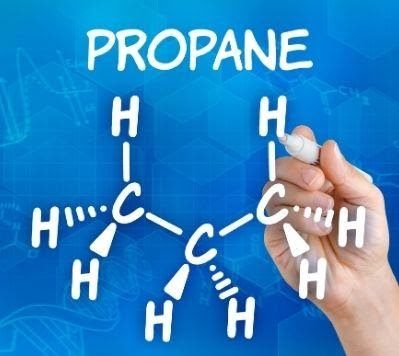The Science of Propane’s Clean Energy | Hydrogen vs. Carbon in Propane
Propane has many environmental benefits over other energy sources. But why? Simply put, propane releases fewer harmful carbon emissions than other fuels. The reason lies in the chemical makeup of propane.
Propane’s chemical composition is C3H8, meaning it is composed of three carbon and eight hydrogen atoms. The majority of the molecule is hydrogen. That means that when propane combusts, the hydrogen atoms produce water vapor instead of the harmful emissions that are associated with other fuels. In fact, one molecule of propane contains about 72% hydrogen atoms, so most emissions simply become water vapor.
Other fuels pose a threat to the environment because of their higher levels of carbon atoms. Since propane contains a low level of carbon, it releases fewer greenhouse gases into the air as it is used. Compared to electricity, propane cuts greenhouse gas emissions by about 43%, and even more when compared to fossil fuels.
Propane burns cleanly because of its combustion process. Propane ignites when it comes in contact with oxygen, so there are no other chemicals involved in the process. Propane combustion produces a lot of heat, making it ideal for use in home appliances such as furnaces and water heaters. Plus, it produces less waste material than other combustion processes such as gasoline, so it is a great alternative fuel to use in vehicles.1
Renewable propane, or bio-propane, is also on the horizon. Made from agriculture waste, it is the same C3H8 molecule but created as a byproduct of other processes and not through conventional oil or gas drilling. Bio-propane is well established in Europe and is finding favor in the United States as well. U-Haul has already committed to one million gallons of renewable program for its operations, and the product is in use in California and other areas which are trying to replace conventional fuels with cleaner alternatives.
There is no perfect solution for solving the world’s pollution problems. However, using propane in homes, vehicles, lawn mowers, agricultural operations, and other viable applications can reduce our carbon footprint. Because of its chemical composition and its combustion process, propane is a clean fuel and a smart choice that not only has environmental benefits but offers benefits in terms of performance, efficiency, comfort and security as well. Propane is an ideal fuel source that can be used without sacrificing performance or requiring a significantly higher price tag. It is available, safe, portable, versatile and proven.
Source:
